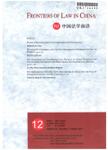THE RULE OF LAW AND EXPERIENCE OF THE KOREAN JUDICIARY
THE RULE OF LAW AND EXPERIENCE OF THE KOREAN JUDICIARY出 版 物:《Frontiers of Law in China-Selected Publications from Chinese Universities》 (中国高等学校学术文摘·法学(英文版))
年 卷 期:2015年第10卷第3期
页 面:428-436页
学科分类:0301[法学-法学] 03[法学] 030106[法学-诉讼法学] 030101[法学-法学理论]
摘 要:As a social norm, law in a democratic society should be established in the form of positive law by collecting opinions of people. In order for the rule of law to be properly practiced in a democratic country, the doctrine of separation of powers requires that the legislative, executive, and judicial functions should not be consolidated in a single body. However, even within a perfectly established legislative system, the principle of the rule of law may be distorted depending on the role of the judiciary. The experience of the Korean judiciary shows that even though it is designed to be a completely independent organ of the lawmaking National Assembly and the law-enforcing executive branch; it would fail to properly give effect to the country's governing principle of the rule of law. It may be thought that the fundamental reasons lie in the endemic tendency towards the rule of man in East Asian societies. Nowadays, those who received education in a democratic society without experiencing the authoritarianism have begun to make inroads into the leadership of the judicial branch. They can be firmly determined to prevent freedom and rights of every single person from being infringed upon. In this way, they can be confident that the judiciary has fulfilled its roles in shaping a democratic country where the rule of law is exercised properly as a governing principle.



